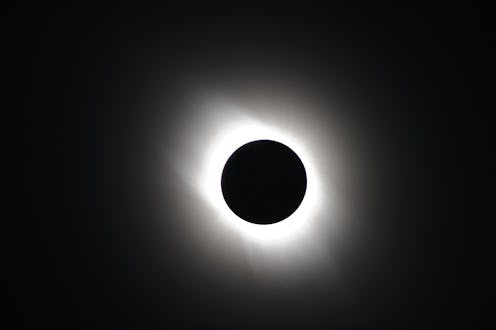Life
PSA: You Need To Protect Your Eyes If You Want To See The Solar Eclipse

The next total solar eclipse is right around the corner — August 21 — and stargazers are planning accordingly, since many of us have never seen one; but does looking at a solar eclipse damage your eyes? Rest assured that as long as you take the proper precautions, you can enjoy the eclipse and hang on to your eyeballs.
From the time we were kids, we were always told not to look directly at the sun. Or the microwave. Don't let those childhood warnings deter you from enjoying the eclipse, though (or the microwave). On August 21, when the moon passes between the earth and the sun and covers us in darkness, all you have to do is wear protective glasses if you plan on observing the sun, and you will be safe from retinal burn. This applies to the entire length of the eclipse, from beginning to end. There is but one exception, and it only applies to some of us: if you are in the path of totality — which is the path that the moon's shadow traces on earth during the eclipse — then it's safe to remove your protective eyewear once the moon has completely covered the sun. Even then, be sure to put them back on before the sun returns.
It's worth repeating: this is the only time it's safe to view the sun with the naked eye. It's never safe to view a partial or annular eclipse, or even partial phases of a total eclipse, without protective eyewear. NASA notes that even when 99 percent of the sun's surface is hidden by an eclipse, that remaining one percent is still powerful enough to cause damage to your eyes. Depending on the circumstances, this damage can be temporary or permanent.
The path of totality for the upcoming eclipse is roughly 70 miles wide and spans from Oregon to South Carolina, passing through states including Idaho, Illinois, and the Carolinas. You can check this state-by-state guide to see more precisely who will fall into the path of totality. Total solar eclipses are so special because the moon completely covers the sun, making for a moment your Instagram followers will certainly be jealous of.
On the 21st, grab your shades, head outside, and enjoy the view. The last total solar eclipse was March of 2016, and the next isn't until July 2, 2019. You won't want to miss it!